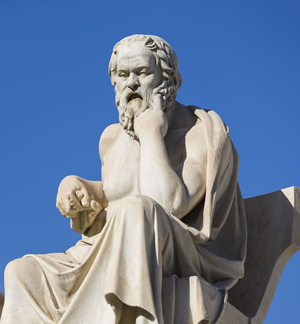
SOCRATES
Socrates was a famous Greek Philosopher who led the foundation of Western Philosophy. Read more about this great philosopher and his teachings in the following article.
“As for me, all I know is that I know nothing” - a famous quote describes the humble and modest attitude of one of the most famous Greek Athenian philosopher, Socrates. Mostly known to the world through the dialogues and works of his students and followers like Plato and Xenophon, he was one of the founders of Western philosophy. Plato portrayed him as the foremost contributor in the field of ethics. According to Plato, Socrates led to the foundation of concepts like Socratic irony and the Socratic Method, or elenchus. Socratic Method is still a commonly used tool for wide range of discussions in classrooms and law school discourses. This method includes asking series of questions not only to bring individual answers, but also to encourage fundamental insights to the current issue. Socrates also made important contributions to the fields of epistemology and logic. The influence of his ideas can be clearly seen during the Renaissance and the Age of Reason in Europe, where various paintings and literary works reflected his views. His legacy was continued by his famous students and followers like Plato, Xenophon, Antisthenes and others.
Socrate's Childhood and Early Life
There isn’t much detail about the birth and life of Socrates. T he only three sources of his much unknown life were the dialogues of Plato and Xenophon and the plays of his contemporary, Aristophanes. Socrates was born in 469 BC. His father,Sophroniscus was an Athenian stone mason and sculptor. His mother ’s name was Phaenarete. His way of living is still unclear till this date. Many ancient texts state that he didn’twork. According to Xenophon's Symposium, Socrates considered discussing philosophy as the only important occupation and art. While Aristophanes claimed that Socrates used to accept payment for his teachings and was running a school, Socrates’s disciples Plato and Xenophon denied the same. Some later sources said that Socrates took over the family profession of stonemasonry from his father and even crafted the statues of the T hree Graces, which claimed to be standing near the Acropolis until the 2nd century AD.
Some of Plato’s dialogues mentioned that Socrates attended military services. He even served in three military campaigns at Potidaea, Amphipolis, and Delium. As described in Symposium, Alcibiades stated how Socrates saved his life in the battle of Potidaea. His valor was also recounted by Athenian General, Laches in the battle of Delium as mentioned in the dialogue Laches. Little accounts of his life refer that in 406 BC, Socrates was a member of boule, which was a council of citizens to look out for daily matters of the city. His tribe,Antiochis held the Prytany on the day the Generals of Battle of Arginusae were accused for abandoning of the slain and the survivors of foundered ships to pursue the defeated Spartan navy. Socrates opposed the unconstitutional demand of the collective trial of the Generals, but by the end of his Prytany, six of eight Generals were condemned to death.
His Philosophy
Socrates foremost contribution to the Western intellectual process was his Socratic method, which he used on various occasions to examine the concepts like justice and goodness. It involves solving a problem by breaking it into a series of questions. T he answers of them usually brought forward the answer that the seeker required. T he formulation of hypothesis in today’s scientific method was derived from this approach. During his trial for corrupting the minds of young Athenians, he used his Socratic method to show how the jurymen were wrongheaded. Socrates believed in immortality of the soul and claimed that God had sent him as a divine emissary. He also said that virtue cannot be taught as successful military fathers couldn’t produce sons of their own qualities. According to him, moral excellence was a divine legacy than parental nurturing. T he above mentioned saying only shows his wisdom as he was aware of his own ignorance. Socrates claimed to have the knowledge of “ art of love” , which he connected in the light of philosophy.
Socrates never asked people to be wise, instead to follow the path of a lover of wisdom. He very often compared himself as a true matchmaker, but distinguished himself from a panderer. Even though he never stated himself as a teacher, he usually led his respondent to a clearer conception of wisdom. He claimed his role as a midwife, who is barren of theories but knows how to give birth to other ’s theories and to determine their worthiness. According to Socrates, the best way to live a happier life was to focus on self-development than the pursuit of material wealth. He always emphasized on brotherhood and building friendship, as he felt it was important for people to grow together as a populace. He even died following the will of his community, hence strengthening the role of the community. His teachings always show that humans possess certain virtues and these virtues are important qualities that a person should have. He stressed that virtues are the most valuable possessions of human beings and life should be spent in the search of goodness.
Personal Life
Socrates was married to Xanthippe, who was said to be much younger to him. T he couple had three sons, Lamprocles, Sophroniscus and Menexenus.
Death
Socrates was always a moral and social critic and hadquestioned about the Athenian politics and society. One of the reasons for his accusation was his paradoxical wisdom which made many prominent Athenians look foolish. He was accused of corrupting the minds of young people and not believing in the God of the state. Subsequently, he was sentenced to death by drinking poison. Death of Socrates was briefly described in Plato's “ Phaedo” . It was mentioned that Socrates turned down the pleas of Crito to attempt an escape from poison. Once he took the poison, he was asked to walk around until his legs felt numb. After a while, Socrates couldn’t feel his legs and few moments later the numbness reached his heart. His last words to Crito were, “ Crito, we owe a rooster to Asclepius. Please, don't forget to pay the debt.”
His Legacy
One of the immediate effects of Socrates’ death was the setting up of new philosophical schools of thoughts by his students and followers. T hey also exercised their perceptions of his teachings in politics. His student Plato founded the “ Academy” in 385 BC which later became so famous that it popularized the word “ Academy” for educational institutions. Plato’s protégé, Aristotle was also a key figure in the Classical Era and founded his own school,the Lyceum in 335 BC. Aristotle was also the tutor of Alexander the Great. Socrates’ thoughts of stressing a simplistic way of living later led to the origination of Cynicism by one of his older students, Antisthenes. T he contribution of Socrates in Western Philosophy became more evident in the Renaissance and the Age of Reason in Europe. A number of paintings and plays from this period depicted his role in the western intellectual process. His scientific method is still being used in classrooms and law school discourses.












































